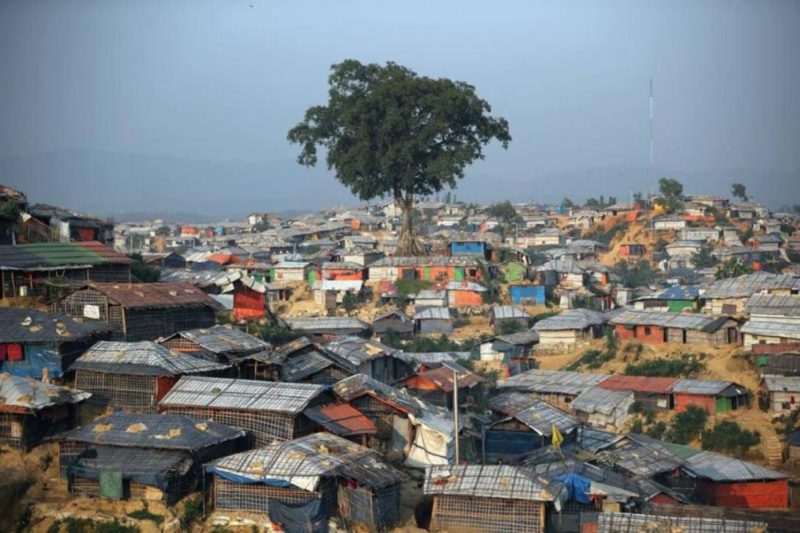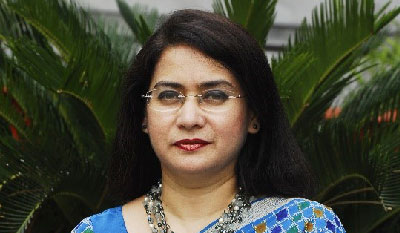Published in on Monday 13 May 2019

Fahmida Khatun
 It has been almost 21 months since the influx of about 750,000 Rohingyas to Bangladesh began in August 2017. Gradually, it is becoming clear to us that the Rohingyas are here to stay for a protracted period of time. Their prolonged stay has serious implications for Bangladesh. Already, massive deforestation in the lush hilly land around Cox’s Bazar has made the whole area barren. The ecosystem is being destroyed. There are also social problems that are affecting the host communities.
It has been almost 21 months since the influx of about 750,000 Rohingyas to Bangladesh began in August 2017. Gradually, it is becoming clear to us that the Rohingyas are here to stay for a protracted period of time. Their prolonged stay has serious implications for Bangladesh. Already, massive deforestation in the lush hilly land around Cox’s Bazar has made the whole area barren. The ecosystem is being destroyed. There are also social problems that are affecting the host communities.
The financial implication of hosting the Rohingyas is also huge. Though a Memorandum of Understating between the governments of Bangladesh and Myanmar was signed in November 2017 for repatriation of the Rohingyas, it did not materialise due to unwillingness on the part of the Myanmar government. The global experience shows that the refugee repatriation time is 10 years on average. Our estimation shows that if the Rohingyas stay for five years from the fiscal year (FY) 2018-2019 onwards, the cost to maintain them will be USD 7,046 million till FY2023. With population growth and inflation adjustments, this cost will continue to increase. Thus, if they stay for 10 years, the cost will be USD 17,204 million.
Who is going to bear this cost? The international community has extended great support in tackling the problem. Not only have they come forward with financial assistance, they are also providing moral support to Bangladesh by raising the issue at international forums. Thanks to the proactive role of the government of Bangladesh, international donor agencies, international and local non-government organisations (NGOs), and many other organisations, the humanitarian activities have been going smoothly. But there will come a time of donor fatigue. This is not only because they may run short of resources, but also because their priorities could shift. We live in a time when crises arise every other day somewhere in the world. International security and cross-border terrorism have become a serious matter of concern. So, everyone rushes to attend the competing priorities on a continuous basis.
Hence, the ultimate burden of the Rohingyas will fall on Bangladesh. Clearly, the policymakers will have to plan for this even though there may be a denial syndrome among them about the length of stay of the Rohingyas. So far, the government of Bangladesh has extended all-out support to the Rohingyas by providing them with shelter and other support. It is unthinkable for any country in the world to do what Bangladesh has done for the Rohingyas. Who doesn’t know the fate of the refugees crossing borders to the developed countries? Haven’t we seen the inhumanity and cruelty of the wealthy and powerful countries even towards the children from poor, war-affected nations? But Bangladesh, despite being a densely populated and lower-middle-income country, has shown such generosity which has put the developed world to shame.
However, when the flow of support for the Rohingyas dwindles, how will the government meet the requirements of the Rohingyas? This is an issue that the government needs to ponder on moving forward. In this regard, an action plan should be in place. There could be a three-pronged approach: first, international dialogues should be continued, and Bangladesh has to pursue more energetic diplomacy at the global level; second, bilateral talks with Myanmar should also be continued. The issue should also be raised continuously at regional forums such as the Bay of Bengal Initiative for Multi-Sectoral Technical and Economic Cooperation (BIMSTEC) and Bangladesh-China-India-Myanmar (BCIM) Economic Corridor. Third, while the dialogues go on, the Rohingyas should be looked after, and their economic and social safety has to be ensured.
Shockingly, some international organisations have come up with the suggestion of forming a solidarity compact. They cite examples of Jordan, Lebanon and Ethiopia which had opted for such a compact in dealing with refugees in their countries. In a nutshell, advocates of such a solidarity compact promotes the idea that the host country should keep the refugees in exchange for facilities such as duty-free market access for its products, migration of its labour force and foreign direct investment into the country.
This is an out-and-out unacceptable and meaningless proposal. Currently, Bangladesh as a least developed country (LDC) gets duty-free, quota-free (DFQF) market access to many countries including the European Union markets. When it graduates from the LDC group, initially in 2024, and finally in 2027 after the three-year grace period, Bangladesh will lose the DFQF market access in any case. Besides, with not so promising global economic outlook and with increased protectionism in the horizon, the desire to have DFQF in exchange for keeping the Rohingyas is wishful thinking. In fact, this whole idea is based on the political economy of the refugee problem. It is also the reflection of a parochial mindset that thinks that the southern countries will host refugees while the northern countries will provide some token support to show their sympathy.
After the initial humanitarian support, now there is a need for developmental interventions for the Rohingyas in terms of access to education and skills development. Developing human capital is a good idea in giving them the opportunity to earn a living. However, that doesn’t imply that the Rohingyas should be integrated into the host society. The host communities are already stressed due to the massive environmental damage and shrinking livelihood opportunities as a result of competition from the Rohingyas who are available at a lower wage. It is time to step up pressure on the Myanmar government for repatriation of their people. The global community also has to accept the fact that the Rohingyas are not only Bangladesh’s responsibility. It is their responsibility, too. The international community has to play a proactive role to support Bangladesh and create pressure on Myanmar for repatriation of the Rohingyas at the earliest.
Fahmida Khatun is Executive Director, Centre for Policy Dialogue (CPD).


